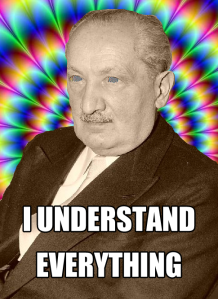http://www.psychologytoday.com/blog/the-child-in-time/201008/what-do-we-mean-thinking
This article is filed under child psychology.I think it is very good and also gives many references.I got into this thinking lark because I was reading Heidegger‘s book,”What is called thinking.”but as I said initially my blog is about books…and all this thinking is tiring me .even though it is fascinating.Heidegger is hard and now I have got a book about Levinas to read too
And though I am very concerned about Heidegger’s being in the Nazi part yet I value his words a few of which I have copied below
So he understood his own actions then?
“If it is Being that most calls for thought, what most calls to be thought about in our age is the forgetting or withdrawal of Being. And it is due to the withdrawal of Being that we are still not thinking. In contrast to Hegel’s notion of history, Heidegger’s is a history wherein we find ourselves increasingly fallen from and more distant from Being. Being withdraws in our technological age as the experience of thinking is reduced to calculative rationality. “Thinking” has become the experience of using rationality as a device to operate on a world of things already reified into a network of ends. In our age, Heidegger (1968) will go on to argue, ratio has trumped legein. The thoughtfulness of calculative rationality threatens to obliterate the possibility for being-thoughtful.
And yet
“Heidegger’s Nazism and the failure to confront it are philosophically significant for Heidegger’s philosophy, for its reception, and for philosophy itself. At a time when some are still concerned to deny the existence of the Holocaust, in effect to deny that Nazism was Nazism, and many still deny that Nazism had a more than tangential appeal to one of the most significant theories of this century, merely to assert the philosophical significance of an abject philosophical failure to seize the historical moment for the German Volk and Being is not likely to win the day. Yet there is something absurd, even grotesque about the conjunction of the statement that Heidegger is an important, even a great philosopher, perhaps one of the few seminal thinkers in the history of the tradition, with the realization that he, like many of his followers, entirely failed, in fact failed in the most dismal manner, to grasp or even to confront Nazism. If philosophy is its time captured in thought, and if Heidegger and his epigones have basically failed to grasp their epoch, can we avoid the conclusion that they have also failed this test, failed as philosophers?
- Tom Rockmore (1992) On Heidegger’s Nazism and Philosophy. Berkeley: University of California Press, p. 289″
Related articles
- Martin Heidegger – Leon (talonsphilosophy.wordpress.com)
- Psychoanalysis Today (psychologytoday.com)
- Reading Heidegger: the ‘Dilthey Review’ I (afterthegramme.wordpress.com)
- Heidegger did one service: He showed us that thinking is not enough (complexnumberblog.wordpress.com)
- Levinas’ Ethics (complexnumberblog.wordpress.com)

